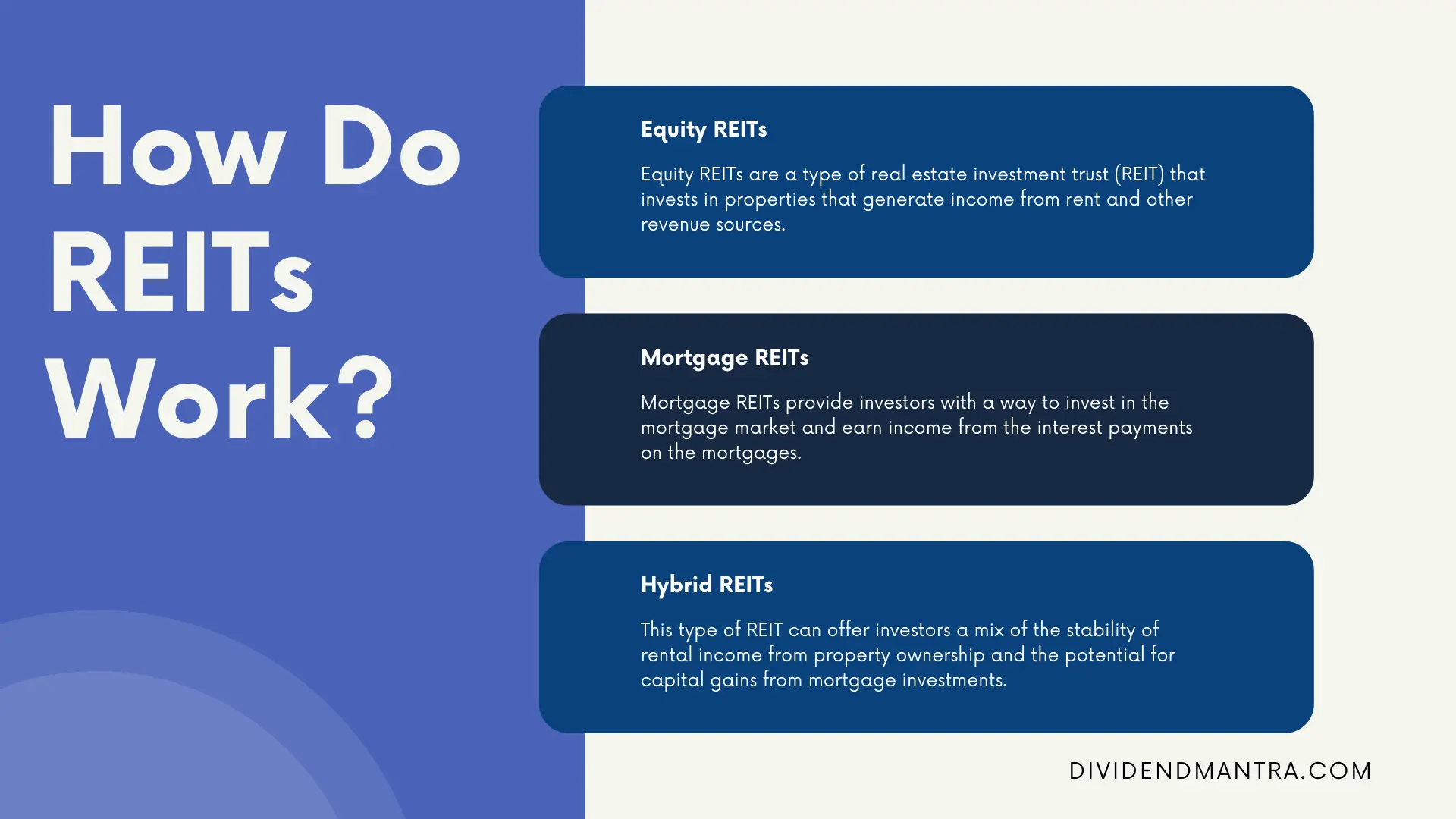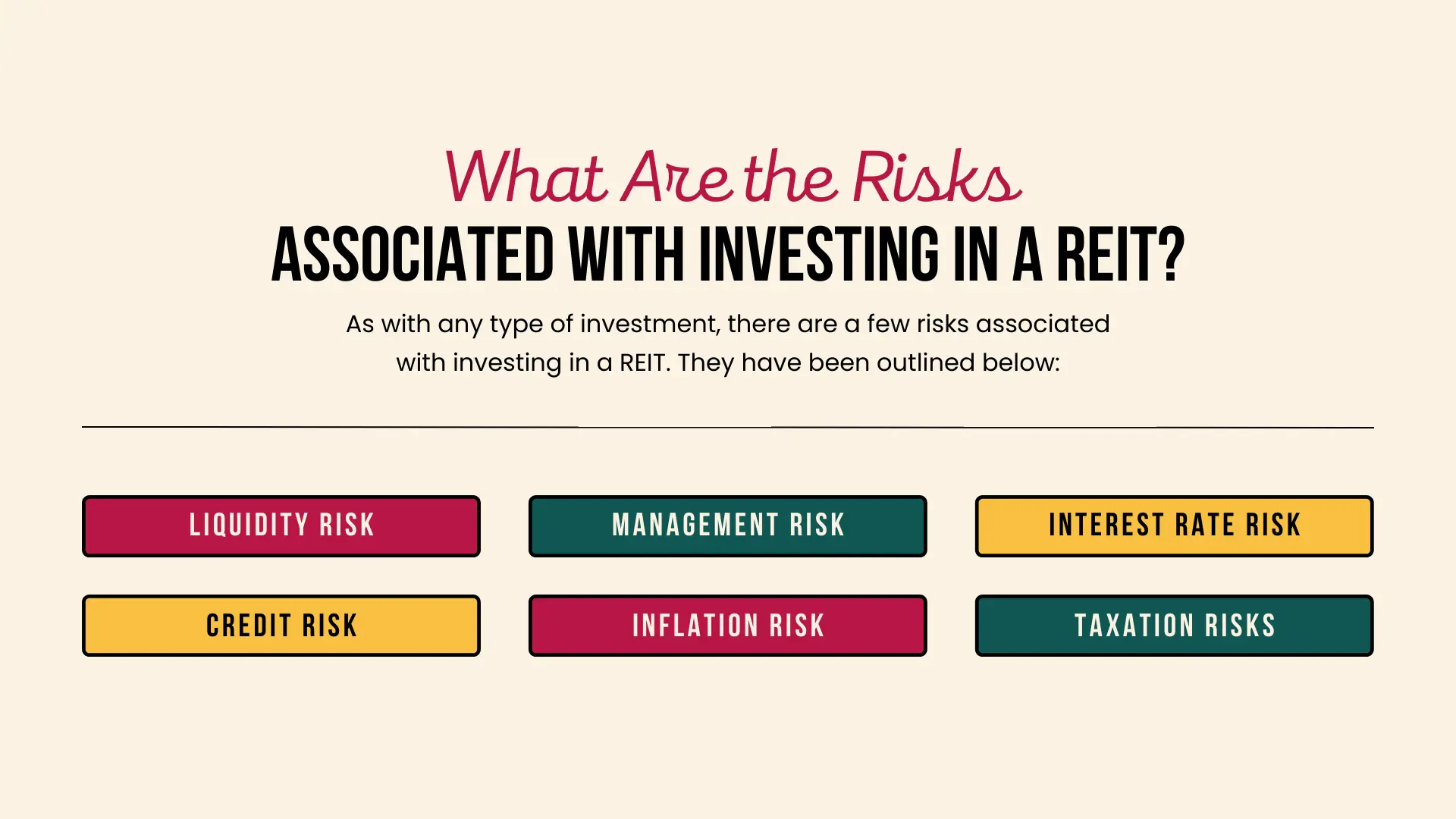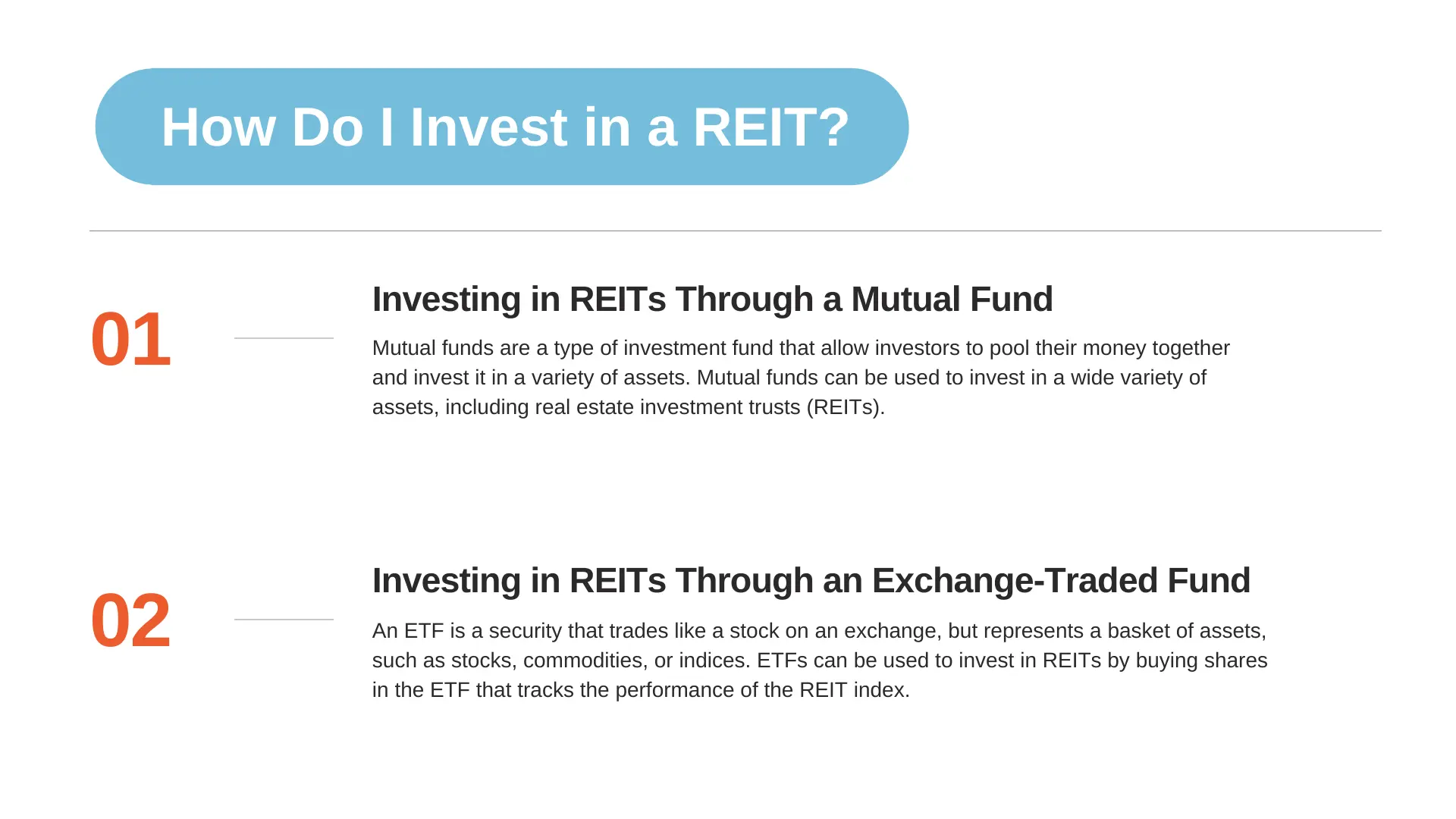What Are REITs and Why Invest In Them?
There is no doubt that real estate investment trusts, or REITs, are one of the most popular and lucrative ways to invest money in the market today. So what are they? Simply put, REITs are a type of investment vehicle that allows investors to gain exposure to a variety of real estate assets through a single investment. This can include everything from commercial property to apartment complexes.
A real estate investment trust, or REIT, is a type of publicly traded company that invests in and manages real estate properties. REITs offer investors a way to access high-quality real estate assets without having to buy and manage individual properties. REITs generally charge lower fees than traditional landlords and have more diversified revenue sources than the average landlord.
How Do REITs Work?

A real estate investment trust (REIT) is a company that owns, and in most cases operates, income-producing real estate. REITs are typically considered to be equity REIT, which means they own and operate income-producing properties. However, equity REITs are just one of the three main types of REITs, the other two being mortgage REITs and hybrid REITs.
1. Equity REITs
Equity REITs are a type of real estate investment trust (REIT) that invests in properties that generate income from rent and other revenue sources. Equity REITs typically focus on the acquisition, ownership, and management of commercial properties, such as office buildings, shopping malls, and apartment complexes.
2. Mortgage REITs
Mortgage REITs are a type of real estate investment trust that invests in mortgage-backed securities. These securities are backed by mortgages, which are loans used to purchase property. Mortgage REITs provide investors with a way to invest in the mortgage market and earn income from the interest payments on the mortgages.
3. Hybrid REITs
A hybrid REIT is a real estate investment trust that invests in both properties and mortgages. This type of REIT can offer investors a mix of the stability of rental income from property ownership and the potential for capital gains from mortgage investments.
What Are the Benefits of Investing in a REIT?
There are many benefits of investing in a REIT. Some of the key benefits include:

1. Diversification: One key benefit of investing in a REIT is that it allows investors to diversify their holdings across a number of different real estate assets. This can help to reduce the overall risk of their investment portfolio while still providing exposure to the potential upside of the real estate market. Additionally, by investing in a REIT, investors can take advantage of the expertise of the REIT’s management team in terms of property selection and asset management.
2. Liquidity: Liquidity is a benefit of investing in a REIT because it allows for the easy purchase and sale of shares. This liquidity can be attractive to investors who are looking for a way to quickly and easily enter or exit the market. Additionally, because REITs are required to distribute most of their income to shareholders, they can offer investors a regular stream of income. This can be helpful for those who are looking for a reliable income stream in addition to potential capital appreciation.
3. Tax Advantages: A real estate investment trust (REIT) is a company that owns, and often operates, income-producing real estate. REITs are allowed to avoid paying corporate income tax on their net profits if they distribute at least 90% of those profits to shareholders in the form of dividends. This tax advantage is a key reason why REITs are popular with investors.
4. Professional Management: One of the benefits of investing in a REIT is professional management. This means that the REIT has a team of experts who are responsible for managing all aspects of the property, from marketing to repairs and maintenance. This can be a huge advantage for investors, as it means they don’t have to worry about anything related to the property. Instead, they can focus on earning returns on their investment.
5. Constant Income: One of the benefits of investing in a REIT is that you receive a constant income stream. This is because the properties that are owned by a REIT are typically leased out to tenants, and the rent that these tenants pay is distributed to the shareholders of the REIT. This means that you can count on receiving a regular payment, regardless of what is happening in the overall economy. This steady stream of income is a benefit that is not found with most other types of investments.
6. Predictability: One of the benefits of investing in a REIT is its predictability. A REIT typically has a well-defined real estate portfolio and business plan, which gives investors a high degree of confidence in the stability of its cash flow and dividends. In addition, REITs are regulated by the SEC and must comply with a number of rules that protect investors. This helps to ensure that the REIT’s financial performance is relatively stable and predictable.
7. Stability: Stability comes from the fact that a REIT typically has diverse holdings of property types and geographic regions. This reduces the risk that any one property or location will have a negative impact on the trust’s performance. This stability makes REITs a desirable investment for investors looking for a consistent source of income. In addition, the real estate market is relatively stable, providing another layer of stability to the investment.
What Are the Risks Associated With Investing in a REIT?

As with any type of investment, there are a few risks associated with investing in a REIT. They have been outlined below:
1. Liquidity Risk: Liquidity risk refers to the potential for an investor in a real estate investment trust (REIT) to face difficulties in selling their shares in a timely manner should they need to liquidate their investment. This can be due to a lack of buyers in the market, or because the price of the REIT’s shares may have dropped (or risen) significantly by the time the investor attempts to sell.
2. Management Risk: Management risk is the risk that the leadership of a company will not make sound decisions that will benefit the company and its shareholders. This can be a particular concern with REITs, as the management team is responsible for making decisions about how to use the money raised from investors to purchase and manage property. If the management team makes bad decisions, it can lead to lower returns for investors or even losses.
3. Interest Rate Risk: Interest rate risk is the possibility that the value of a security will change as interest rates fluctuate. This is especially a concern for investors in REITs, since the prices of these securities are closely tied to movements in interest rates. For example, if interest rates rise, the price of a REIT may fall. Conversely, if interest rates fall, the REIT’s share price is likely to rise as investors seek higher returns in a low interest rate environment. This risk is one reason why it’s important for investors to carefully consider their options before investing in a REIT.
4. Credit Risk: Credit risk is the potential that a borrower will not repay a loan, leading to a loss for the lender. When investing in a REIT, credit risk is one of the main risks that investors face. This is because REITs often have high levels of debt and are therefore more vulnerable to defaults. In addition, the value of a REIT’s assets can decline if the economy weakens, leading to additional losses for investors.
5. Inflation Risk: Inflation risk is the potential for the value of a financial asset to decrease due to rising prices in the economy. Inflation can erode the returns on investment, particularly if the investment is held for a period of time. For this reason, investors should consider the potential impact of inflation when making decisions about investing in real estate investment trusts (REITs), or any investment for that matter.
6. Taxation Risks: Taxation risk is the risk that changes in tax laws or in the interpretation of tax laws could adversely affect the value of a REIT’s investments. For example, if a REIT holds taxable assets, it could be subject to higher taxes if the tax laws change. In addition, a REIT’s income could be reduced if the IRS reclassifies some of its income as taxable income.
How Are REITs Different From Other Types of Investments?
Real estate investment trusts (REITs) are a type of security that is traded in the stock market. They are different from other types of investments because they are a way to invest in real estate without having to buy a property. REITs own and operate properties, and when you invest in a REIT, you become a part of that ownership.
How Do I Invest in a REIT?

To invest in a REIT, an individual would need to open a brokerage account and buy shares of the REIT just as they would any other stock. The price of a share will vary depending on the market conditions and the performance of the REIT. Some people may also choose to invest in a REIT through a mutual fund or exchange-traded fund.
1. Investing in REITs Through a Mutual Fund
Mutual funds are a type of investment fund that allow investors to pool their money together and invest it in a variety of assets. Mutual funds can be used to invest in a wide variety of assets, including real estate investment trusts (REITs).
Mutual funds work by pooling the money of many investors and investing it in a variety of assets.
Examples of mutual funds that allow you to trade in REITs are MFS Global Real Estate R6, MFS Global Real Estate A, Cohen & Steers Instl Realty Shares, James Alpha Global Real Estate Invsmts I, Janus Henderson Global Real Estate D.
2. Investing in REITs Through an Exchange-Traded Fund
An ETF is a security that trades like a stock on an exchange, but represents a basket of assets, such as stocks, commodities, or indices. ETFs can be used to invest in REITs by buying shares in the ETF that tracks the performance of the REIT index. When you buy shares in an ETF, you are buying a piece of the underlying assets that the ETF holds. This gives you exposure to the performance of those assets without having to invest in each individual security.
An example of an exchange-traded fund that allows you to trade in REITs is the Vanguard REIT Index Fund. This fund tracks the performance of the MSCI US REIT Index, a benchmark that includes over 100 real estate investment trusts. The fund has an expense ratio of 0.12%, and it is currently trading at a price of $155.15. We have also covered a separate article in detail about how you should invest in REITs.
What Are Some of the Most Popular REITs
Some of the most popular REITs are Equity Residential, Simon Property Group, and Public Storage. Equity Residential is a REIT that owns and operates apartments in major cities across the United States. Simon Property Group is a REIT that owns and operates shopping malls and other commercial properties. Public Storage is a REIT that owns and operates self-storage facilities.
Conclusion: Should You Invest in REITs?
In conclusion, REITs are a great investment option for those looking for stability and consistent income. They can provide portfolio diversification and offer a high degree of liquidity. REITs are also relatively low-risk, making them a popular choice for those who are risk averse. For these reasons, investors should consider adding REITs to their portfolios.
If you’re interested in investing in REITs, you may consult with your financial advisor to learn more about the best way to add them to your portfolio.







